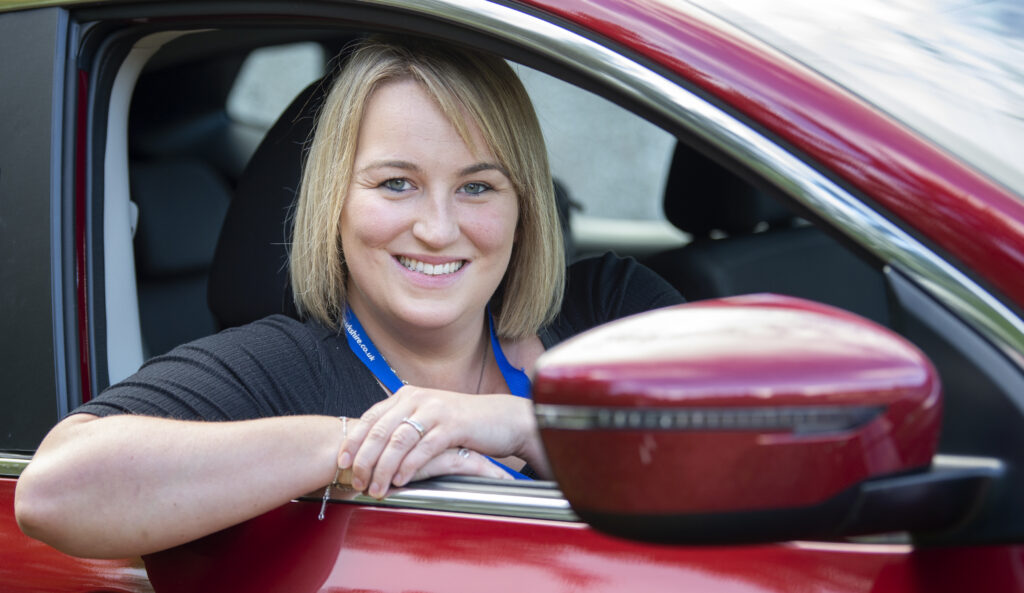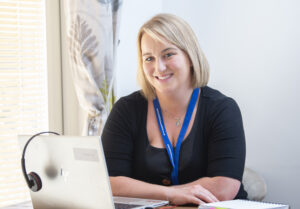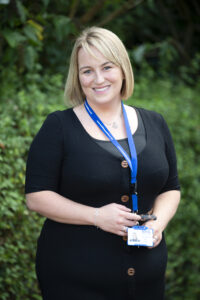Kelly Frame
Community Learning Disability Nurse
NHS Lanarkshire

I like that working in the community you get to support people throughout their journey. In a hospital setting, you might only see and treat the immediate health concern but in community nursing, you are involved in the ongoing journey with a person. Seeing someone in their own environment can also help identify contributing factors that they might not think to tell you about. Sometimes this includes families and carers who, although mean well, might be affecting a patient’s recovery by telling a story through their own lens. I was originally an adult nurse working predominantly with patients suffering from dementia, within inpatient settings and care homes. These settings allowed me to develop my team working and leadership skills, as well as gaining experience of working with patients with multiple health needs including communication difficulties, behaviour that could be perceived as challenging and palliative care. I had always had an interest in working with people with learning disabilities and felt that the skills and experience gained in my first posts were transferrable to this role. This led me to train for my conversion degree in learning disability nursing so I could explore this further.
As a community learning disability nurse, I work as part of a multi-disciplinary team with psychiatrists, psychologists, physiotherapists, occupational therapists, epilepsy and autism specialist nurses and a forensic nurse practitioner. The team continually strives to meet the unmet health needs of people with learning disabilities, reduce health inequalities and improve the quality of lives of our patients and those who provide support for them. Working in community you need to be prepared for the unexpected. You become a big part of people’s life. We are emotionally invested and there are huge rewards from that. It is an honour to be involved in the way we are.

When I undertook my learning disability nursing degree I was surprised by the level of discrimination and inequality for people with a learning disability. People with learning disabilities do not receive the same level or standard of health care as the general population and experience multiple barriers to accessing care. I am committed to being an advocate for people with learning barriers to reduce these inequalities. I work closely with advocacy services, support teams and carers groups to understand patients and their families’ needs. Some people that we work with have communication difficulties and others have specific challenges in understanding information. As an LD nurse, I work to ensure that information provided to patients and their families is accessible, this can be through assistive technology, social stories, providing pictures or symbols or using language that is more familiar to the patient.

My role as a community learning disability nurse is so wide and varied. My aim as a community learning disability nurse is to support patients with their unmet health needs, these health needs can be both physical and mental health needs. I complete a detailed health needs assessment before formulating person centred care plans. Communication skills, person centred care planning and expertise in assessing risk and are most important for my role.
An example of a case I was involved in: an eighteen-year-old woman had finished her school placement and moved onto college, however she really struggled with the transition. The patient was distressed at home, had become aggressive towards family members and not sleeping. I worked with the patient and her family to develop different coping strategies for her, gave her the space to identify her emotions and ways to explain them. She really connected with mindfulness activities and visual timetables to help her manage what to expect from each day. We created a family planner so that there was predictability to her week, and she could see what was to come. This enabled her to manage a change which she had not chosen.
I am involved in a support group that teaches coping skills and supports people understand what anxiety is, what it feels like in your body and how to cope with this. It is a 6-week course where we share coping techniques and grounding skills. Giving people the tools to recognise and identify their issues is really empowering.
I also work with care support teams, social workers and family members. Many of the people we support have paid carers from other organisations so as a team we might develop support plans together and offer training for others involved in providing care and support.
The programme has taught me a lot about self-care. You must put on your own oxygen mask first before you can help others. I now know and understand my own trigger points and when I am feeling burnt out. I now have a greater belief in myself as a person, my skills, and my choices. I now think more about instilling self-care values in other members of staff.
Being away at the first residential workshop taught me so much about myself and mindfulness. Even just to be able to go for a walk without my phone and not to always multi-task. I now try to incorporate taking mindful walks into my day, where I absorb my surroundings and notice things.
Being part of the Queens Nurse Programme has significantly improved my own self confidence and made me think more about the impact that I have on others. I am so grateful to have been given this opportunity and to be part of this community.

COVID – 19 has had a huge impact on the way that services and healthcare is delivered. Personally, I was redeployed from my community learning disability nurse role to work within the Specialist Assessment and Treatment Unit. This unit provides specialist assessment for people with learning disabilities, often with significant mental health issues or behaviour that is perceived as challenging. COVID added an additional trigger point for many of these patients as many had limited understanding, staff were wearing unfamiliar PPE, activities were restricted due to social distancing requirements and visitors were prohibited. Although challenging, I am so grateful for the opportunity to work with patients in this environment.
